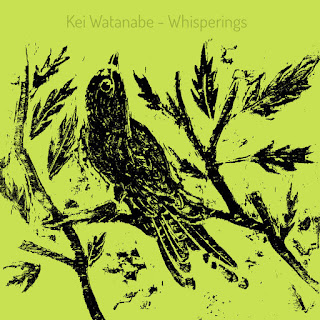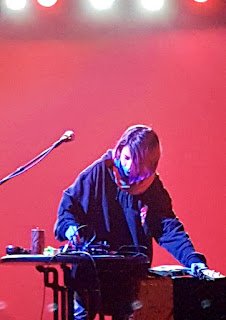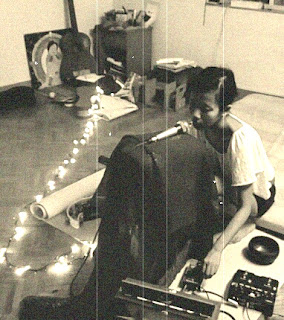Kei Watanabe: Whisperings
 Navel-Gazers #32 is an interview with Kei Watanabe who is going to talk to us about Whisperings. I’ve had this recent release - from the prolific Syrphe label - on constant rotation here at my flat. I tend to listen to it through speakers, rather than headphones as it seems to play nicely with the ambience of the room and the urban clatter drifting in from the backyard, almost like a friendly ghost just puttering around the place. In fact Kei’s music is described as “ghostly”… stylistically, it’s experimental for sure, singular and unique, and yet there is something… familiar about this music I can’t put my finger on. It’s like accessing a memory… almost like that feeling you get when you remember a dream you’d forgotten all about, and then suddenly it all floods in... the sounds here, which include tape machines, loop pedals, voice, various bells and other found objects and instruments, are familiar enough as well but on “Whisperings” I seem to rediscover their properties. So, who is Kei Watanabe? Well the name is Japanese, she’s from Sri Lanka and based in Berlin so I’m sure there’s a whole story to unravel there. But aside from that I don’t know a lot about her. There’s some basic information on her website and then we have this mystery album! Let’s find out more from Kei…
Navel-Gazers #32 is an interview with Kei Watanabe who is going to talk to us about Whisperings. I’ve had this recent release - from the prolific Syrphe label - on constant rotation here at my flat. I tend to listen to it through speakers, rather than headphones as it seems to play nicely with the ambience of the room and the urban clatter drifting in from the backyard, almost like a friendly ghost just puttering around the place. In fact Kei’s music is described as “ghostly”… stylistically, it’s experimental for sure, singular and unique, and yet there is something… familiar about this music I can’t put my finger on. It’s like accessing a memory… almost like that feeling you get when you remember a dream you’d forgotten all about, and then suddenly it all floods in... the sounds here, which include tape machines, loop pedals, voice, various bells and other found objects and instruments, are familiar enough as well but on “Whisperings” I seem to rediscover their properties. So, who is Kei Watanabe? Well the name is Japanese, she’s from Sri Lanka and based in Berlin so I’m sure there’s a whole story to unravel there. But aside from that I don’t know a lot about her. There’s some basic information on her website and then we have this mystery album! Let’s find out more from Kei…AC: Thank you for joining me on Navel-Gazers! As you can see this album ‘Whisperings’ has made a real impression on me. I have a lot of questions about it but first why don’t you tell us about yourself, your background, and how you got started doing this stuff?
Kei Watanabe: I was born in Colombo, Sri Lanka to a Sri Lankan mother and Japanese father, where I grew up and lived till my early 20s.
Growing up, I was lucky to be able to dabble in a few instruments. Never too deeply, but probably in more than homeopathic doses.
I wonder how to answer your question with regard to how I got started doing 'this stuff' and what 'this' means - because I probably could access this question in different ways.. But if 'this stuff' means more of what I do with the album, it started with me trying to cope/communicate/process tremendous amounts of heartache.
I probably went through a large part of my life disconnected from my emotions/ feelings and feeling pretty dissociated in general and for a long while struggled with communication - although I grew up in a multilingual family and environment, I felt that I couldn't find the words to express how I felt - not even close. There was a massive disconnection.. After completing my Bachelors in psychology, I went to India to study yoga and meditation for a while. There I met this teacher who introduced me to this poem, I think it was an Emily Brontë.. And the words just hit straight to my heart. I felt for the first time it was possible to match- find words and combinations that fit..
I moved to Japan soon after that, still carrying a lot of pain and sadness, and life there wasn't a walk in the park either. I would sit inside the Oshiire (押 し 入 れ) and try to find how I could possibly move stuck feelings-energy in side my body, and often try to allow my throat to express what it wanted - it was often babbles of random sounds.. If I couldn't find the exact words - then maybe I find the exact sound at least that matched.. (It was much later that I realized there was a whole field of yoga dedicated to this called Naad Yoga - the yoga of sound.) When I moved back to Sri Lanka, Isaac Smith invited me to these sessions where we would just play around with instruments and sound. Sometimes it would be just the two of us, and other times many. During this time Rosie Langabeer gifted me a looper that she had let me use a couple of times in these jams. This for me was the biggest turning point, music/ sound wise. I found through this medium that I could express complex feelings and thoughts, layer by layer.. It fit me so incredibly well and I spent a lot of time alone with it in moments of deep grief, trying to understand what I was feeling, trying to let go, crying a lot, and trying to accept, most importantly trying to connect with myself, my body, and heart.. to heal.
At some point I started recording some of the pieces onto my phone, and I uploaded them directly onto Soundcloud just to have a personal record of it, since I didn't own a laptop. One piece from this time is also on the album.
So eventually I started playing with a few friends at these Listening Sessions called Big Ears hosted at Music Matters, Colombo and it slowly grew from there.
AC: So the struggles you were describing, pain and sadness and also the difficulty with verbal communication, when you had these turning points in your listening sessions did those things improve in everyday life? Or has the music been more of a refuge or kind of.. escape from the everyday?
Kei Watanabe: I don't know if it really improved anything - I still feel quite clumsy with my words and verbal expression (which is why these replies take so long, I'm sorry) but it gave me an access point of sorts to process feelings, emotions, things that came up (if I allow space and time for it..)
I guess for me making music is a ritual space - sometimes I bring intentions, prayers, things I wish to offer, things I wish to heal, transform, let go etc and then try to be open to what happens. There is a lot of desperation - I used to, and still do but to a lesser degree, put a lot of pressure on myself especially during live performances because it involved other people in the same space of creation so I felt I had to have really really clear and good intentions. I think there is so much pain in the world and grief that we carry inside of us - I want to acknowledge that and also pray for some sort of soothing or easing. Of course people can leave if they want to / turn it down but as music is so 360degrees and more, I feel a lot of responsibility subjecting people to listen to it. It's only recently that I started to think that perhaps I don't have to take it so seriously and also try to enjoy the situation of performing and allow silliness to have its place too.
AC: What was it that was so cathartic about the looper? Is it the layering?
Kei Watanabe: It's definitely the layering with the looper - it's how I wish I could communicate on a daily basis. The looper allows me to express my dozen or more different facets/ fragments of myself/ personalities/ layers/ ideas/ perspectives into this little package of time, it just 'clicked' with me. To know that this way of expression was possible was such a relief to my system.
AC: Yeah I often think we get that kind of liberation with sound recording as well, particularly when you get into layering by overdubs.
This reminds me of a question I wanted to ask you: is there actually any overdubbing on ‘Whisperings’? If we refer to ‘Whole In My Heart’ - which strikes me as the centrepiece - there are several layers of voices, there’s guitar and incidental sounds like car horns.. I assumed there was overdubbing but now I’m wondering if it’s a single “looper” performance?
Kei Watanabe: There is a little bit of overdubbing on the very end of Born in a Lemon Basket.
Apart from that all are live recordings - some have been edited a bit by Cedrik Fermont, who also did all the mixing and mastering.
Whole in My Heart is a single looper performance. I recorded it in my bedroom in Colombo on my phone - the sounds of traffic, the birds, wind etc are all sounds from outside my window.
I also didn't own a laptop for many years so it was a very direct process.
AC: It looks like Lila was also recorded on your phone, so am I right in thinking that one was also recorded in Colombo?
Kei Watanabe: Yes Lila was recorded on cassette in Colombo. I really wanted to work with cassettes for a while but couldn't find any in town. My friend Tso Roshan managed to find one for me and I recorded a few tracks on it before it sadly stopped working. I think this is probably my favorite medium to record on, I love the warmth and the personality they add to the recording.
AC: You seem to have had a good community of artists in Colombo with the Music Matters group. What about in Japan, did you ever find other artists there to link up with? What about currently in Germany? Is it important to you to connect with other artists for your creativity? Is it important to connect with listeners?
Kei Watanabe: Unfortunately I didn't connect with any artists in Japan. I was quite lonely in Japan and I think the one of the few times I played with another musician was in an underground passageway where musicians sometimes play.
With regard to collaborations, sometimes I get protective over my process and want to do it in private or get into a headspace where I don't want to be influenced by anything or anyone outside of myself.. Which is a bit silly because connection is very dear to me. In Germany I've collaborated with other musicians, film makers, dancers and poets. It is such an act of trust to share art, I think. I tend to have moments when I feel very anxious and over think so it's incredibly important that I work with people I feel comfortable and safe with. (not that that always happens)
Connecting with listeners.. I couldn't be more grateful for this. I feel incredibly lucky that there are people who listen to what I have made and who share with me their thoughts and feelings about it. I can't imagine that being so easy either, especially if it's sincere. It is so precious to me, to have read their words, sometimes I read them and it feels like their words are coming from the same or at least very similar place as to when I've created it. That in itself to me, is a collaborative treasure.
With performing, the connection with the listeners becomes even more important, and I might even dare say it is everything sometimes.
My friend Isaac once told me, 'trust the trance and allow it to happen.' right before we performed together. I think this trance space is created together, if it is allowed. It also comes down to me learning to trust my intuition more and allowing more space to let unfold what wants to be unfolded and developing a stronger 'trance muscle'.. but I'm very interested in seeing what the space we co create allows.
Kei Watanabe: I got to know Cedrik when he was compiling the Uchronia album, which is an amazing compilation of sounds from artists from Asia and diaspora. I was really happy to be on this album because it really felt like there were family around the world who chose this way of expression. I think this connection is one of the most beautiful things for me to come out of what he does. We met again when I moved to Berlin and did a small show where my main gear failed on me but we managed to improvise. In between talking a lot about pickling vegetables, he asked me about doing an album. It took me a while to work on it because I was working at that time and was incredibly stressed out, it was also an really important time because for the first time in my life it made me really question how I wanted to use my resources (my energy) while being in Berlin and started a whole new process for me. Cedrik offered his space to do the recordings, where he would set up the mics for recording and go downstairs (or upstairs?) to cook dinner, and I would just play for some hours alone. We sat together to decide on which parts that would make it to the album, and anything that we wanted to be adjusted.
AC: I’m also interested in the woodblock cover art by Sharon Tan. I love this bright-green image. Who is Sharon Tan?
Kei Watanabe: I met Sharon Tan through Cedrik. She's an artist based in Berlin, and we exchanged a few simple emails about the album, and had one zoom call about it. We both shared a love of plants (she also has a garden), birds, interest in the topics of life, death and rebirth, and nature spirits - the conversation flowed easily. The first time I saw the outline was when Cedrik showed me the photo of the completed wood block. The colors somehow were pretty clear for me right from the beginning that it would be yellow green toned. Cedrik then printed each of the album covers by hand, and hand wrote all the details of the album as well. I believe for these releases, he wanted to use recycled material and keep it as eco friendly as possible, and worked really really hard on them.
AC: I must have discovered your music on that Uchronia album, it’s a goldmine!
Well it has been great talking and learning all about 'Whisperings'. What’s next for you Kei? Any new projects or activities you’d like our readers to be aware of? Final thoughts?
I would like to learn a lot of things - I would love to learn how to use a DAW (and German) and would also really love to create immersive spaces/ work on installations.
Lastly, I would like anyone reading this to pay attention to the situation in Sri Lanka.
Thank you so much for reaching out and for your patience Andrew!
Kei can be found at her website https://keiwatanabe.co/.
Image credits
1) Maurice Schneider
2) Ana Torres
3) Farrah Watanabe
4) Kei Watanabe
5) Kei Watanabe
6) Yazmin Yousuf








